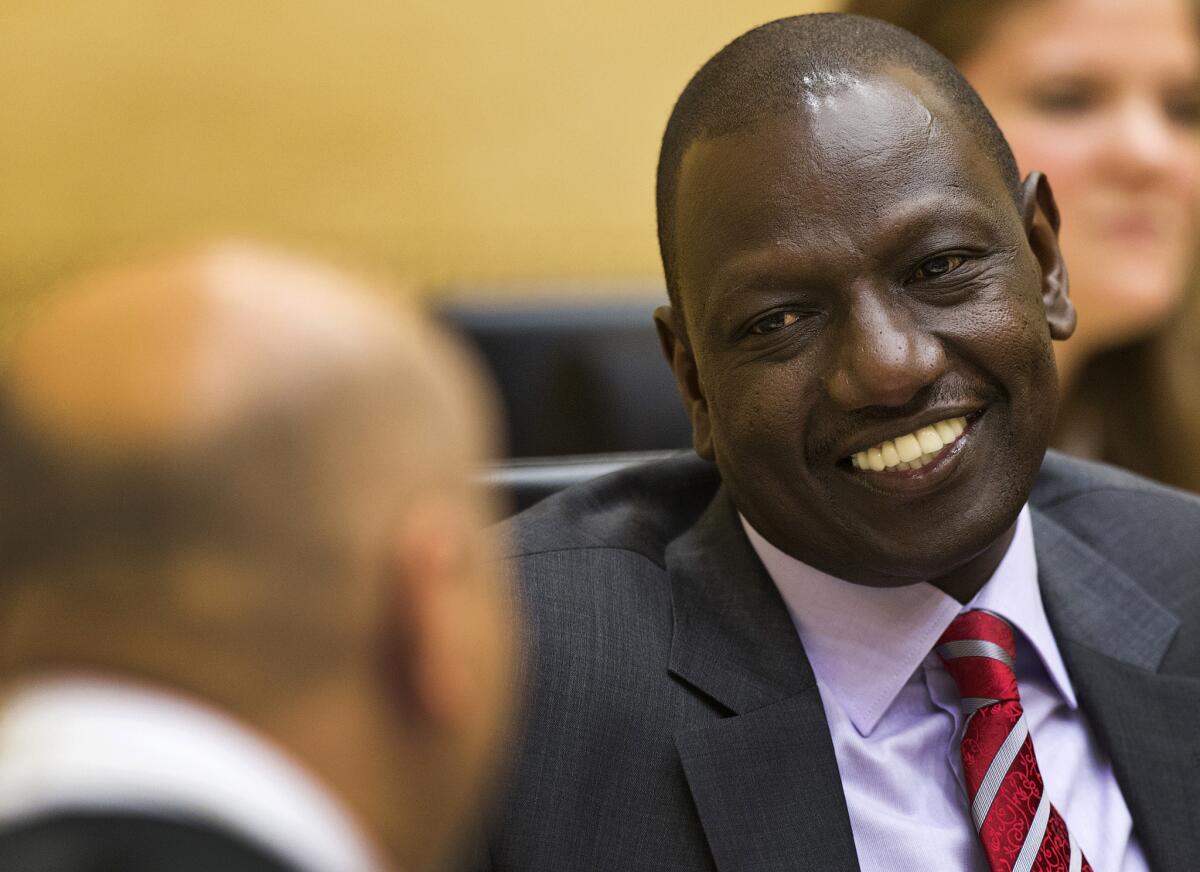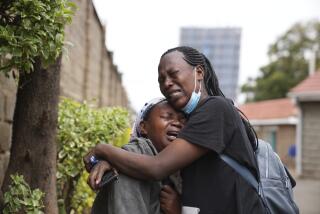Kenya deputy president denies guilt before international court

JOHANNESBURG, South Africa--Kenya’s deputy president, William Ruto, pleaded not guilty Tuesday to crimes against humanity at the International Criminal Court in The Hague, in a case that figuratively puts the prosecution and the court itself on trial amid accusations of anti-Africa bias and shoddy prosecution work.
Ruto’s co-defendant, former radio announcer Joshua arap Sang, also pleaded not guilty in the case over the violence that saw at least 1,500 people killed after Kenya’s disputed 2007 election. In one incident, as many as 35 people, mainly women and children, were burned alive in a church in Kiambaa, near Eldoret in western Kenya.
Prosecutor Anton Steynberg said his team would prove that Ruto directed a criminal network that held many meetings to plan ethnic attacks in case his political party lost. Ruto, he said, was the “ultimate controlling hand” who supplied the weapons and money to youths who carried out violence against members of the Kikuyu, Kamba and Kisii ethnic groups, aimed at driving Ruto’s political opponents from Kenya’s Rift Valley.
The prosecution alleges Ruto mobilized tribal, military, political, media and financial leaders in support of the plan.
Kenyan President Uhuru Kenyatta, who is also charged with crimes against humanity over the 2007 and 2008 post-election violence, will face trial in November. Both Kenyatta and Ruto promised to cooperate with the Netherlands-based court before their election, brushing aside questions on whether having two of Kenya’s leaders facing ICC trials would hamper governance.
But on Sunday, Kenyatta threatened to stop cooperating if both men faced trial at the same time, and Kenya’s parliament last week voted to withdraw from the ICC, a move analysts warned could prompt other African countries to follow suit, threatening the future of the court and the international system of justice for heinous crimes like genocide and ethnic killing.
At the time of the 2007 election, Kenyatta and Ruto were on opposing sides, and Kenyatta is accused of using a criminal gang called the Mungiki, to carry out attacks on Luo and Kalenjin people. They formed a powerful political alliance before this year’s March election, and Kenyatta won in the first round of the vote by a tiny margin with Ruto as his running mate.
Prosecutor Fatouda Bensouda has accused Kenyan authorities of failing to cooperate with ICC investigators, and complained that witnesses have been threatened. Numerous witnesses in the cases against Ruto and Kenyatta have withdrawn.
Steynberg on Tuesday laid out the case against Ruto and Sang, accusing Ruto of running a mafia-like network with a clear chain of command that he unleashed after the 2007 disputed election. Densely populated Kikuyu areas were targeted for attack.
Sang, the radio announcer, encouraged people to carry out attacks, he said. Young men who participated were paid, while those who refused to join in were punished, according to the prosecution case.
Up to 35 people in Kiaamba took refuge in a church where they believed they would be safe. They were locked in and the church was set ablaze. Those who managed to flee were hunted down, Steynberg said.
Wilfred Nderitu, counsel for 628 victims in the case, said many victims had been harassed and intimidated in recent months in the heated political controversy over the role of the ICC.
“Being a victim in Kenya today is a difficult task, emotionally, physically, socially, economically and politically,” he said.
Nderitu also expressed dismay about the withdrawal of prosecution witnesses, saying this threatened a fair trial.
“The root cause of these unprecedented withdrawals has yet to be established. The withdrawals, if unchecked, will threaten the credibility of this trial. The withdrawals could well spell the death knell for this court and international justice,” he warned, adding that victims looked to the court hoping that justice would be done and ultimately reparations paid.
Defense attorney Karim Kahn launched a stinging attack on the “pathetic” ICC prosecution, which he called a “clear conspiracy of lies.” He said the case was based on lying witnesses and predicted that either the case would collapse or the defendants would be acquitted.
“The prosecution slipped on a few banana skins on the way, they got it so obviously wrong,” he said. He suggested witnesses withdrew not because they were afraid, but because the prosecution case was flawed.
“We say there’s a rotten underbelly to this case that the prosecution has swallowed hook, line and sinker, indifferent to the truth.”
Former U.N. Secretary-General Kofi Annan wrote Tuesday that the case went to the ICC only after Kenya failed to set up its own tribunal to investigate and prosecute the attacks.
“There have been active efforts to paint the ICC cases as an assault on Kenya’s sovereignty. The supporters of Mr. Kenyatta and his running mate, Mr. Ruto, who won the presidential election earlier this year despite the charges against them, have spoken often of the meddling of ‘foreign powers,’” Annan wrote in the opinion piece in the New York Times. “But the record is clear and there should be no doubt: it was the Kenyan government’s own failure to provide justice to the victims and their survivors that paved the way to the ICC, a court of last resort. These trials also do not reflect the court’s unfair targeting of Africa, as has been alleged.”
The case continues.
ALSO:
India court finds four men guilty in bus gang rape
Guatemala passenger bus plunges into ravine; at least 38 killed
France to introduce U.N. resolution on Syria chemical weapons
Twitter: @latimesdixon
More to Read
Sign up for Essential California
The most important California stories and recommendations in your inbox every morning.
You may occasionally receive promotional content from the Los Angeles Times.










